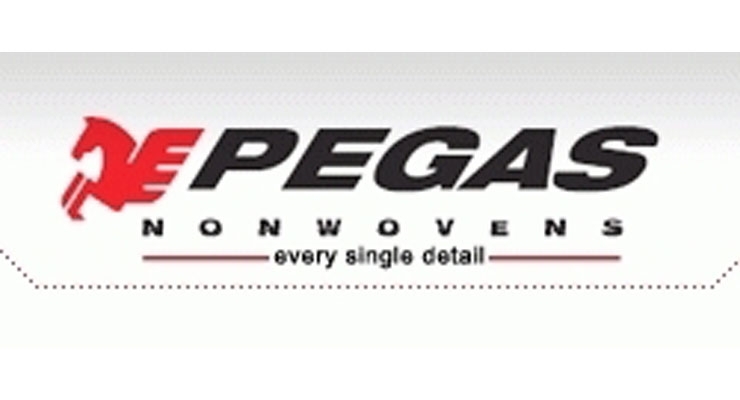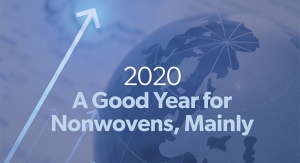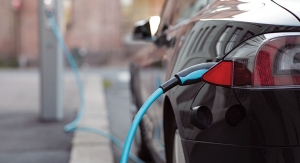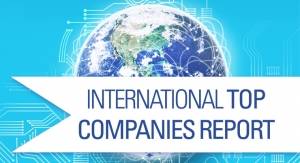09.11.17
Znojmo, Czech Republic
www.pfnonwovens.cz
2017 Nonwovens Sales: $264 million
Key Personnel
Frantisek Rezac, CEO; Fratisek Klaska, CTO; Marian Rasik, CFO
Plants
Znojmo and Bucovice, Czech Republic; 6th of October City, Egypt; Capetown, South Africa
Processes
Spunbond, meltblown, SMS, bicomponent
Major Markets
Hygiene, agriculture, healthcare, ecology, furniture, building, protective apparel, industrial
A new name, a new owner and new global operations are among the highlights for PFNonwovens, formerly Pegas Nonwovens, the Czech Republic’s largest nonwovens producer. In May 2017, Czech-based private equity firm R2G purchased a majority stake in the company. At the time of the acquisition, R2G said it hopes to turn Pegas into the truly global nonwovens operation, and so far the company seems to be on track to do just that. In May, R2G announced that it would buy the nonwovens operations of First Quality Nonwovens, including spunmelt assets in Pennsylvania and China, giving the company immediate entry into two of the largest nonwovens markets in the world.
“We believe strongly in the nonwovens business,” says Michal Smrek, CEO Of R2G. “This transaction will enable us and our group companies to support our global customers across four continents. Post transaction, we will have state-of-the-art production facilities and unrivalled know-how and R&D expertise to ensure that our customers benefit from the premium products we offer and the joint innovation and synergies that this combination will bring. When we acquired Pegas, we said that this was the first step to building a global platform. This transaction is the second step and we look forward to now investing into our global platform and the people that have made the production companies a success.”
Together, the two companies will make about 250,000 tons of nonwovens at sites in Pennsylvania, China, Egypt, South Africa and the Czech Republic. Total sales will be in the $550-600 million, making the company, which changed its name to PFNonwovens in June, one of the largest suppliers of spunmelt nonwovens to the hygiene market in the world.
Meanwhile, at PF’s existing nonwovens operations, the company continues to expand it scope globally by focusing on making state-of-the-art spunmelt nonwovens.
In 2017, the company’s sales rose 7% to reach €220.8 million ($264 million) thanks to increased capacity from new production volumes as well as higher polymer costs. About 87% of its sales are conducted within the global hygiene market while the remaining 13% are split between construction, medical and agriculture.
By region, the company’s largest segment is in Eastern Europe, comprising 41.6% of sales and Western Europe, which represented 36% of sales. The remaining are split around the world.
In investment news, PF is currently adding new lines in South Africa and the Czech Republic. In South Africa, PF purchased a plot of land and has ordered a production line, a S-Twin MB-S 2600 Reicofil 4S Compact bicomponent line, that will be able to make 10,000 tons of material per year. It is expected to come onstream in late 2018 or early 2019.
Pegas built a similar line in Czech Republic last year. “For South Africa, this investment represents a huge step forward in the area of nonwoven textile technologies for hygiene applications,” Rezac says. “We are excited about expanding into a new fast growing market and hope that it marks the beginning for further growth in the region. We expect that we will start to supply the first commercial products from the new production line at the beginning of 2019 so that we fulfill the long term agreement with one of our major customers for the delivery of a significant part of the new plant’s production output,” says Rezac.
Meanwhile, in Znojmo, Pegas announced in September it was adding a semi-commercial Reicofil 5 bico production line, which will be the building block of a new global innovation center. The line’s capacity will depend on the input of raw materials and the types of products made and will likely be in the range of 8000-15,000 tons per year. It will begin operation in the third quarter of 2019.
“By signing this memorandum, we have reached an important milestone of the project that we have worked on intensively with Reicofil for the last two years with the objective of developing a new type of technology,” Rezac says. “This new technology is based on the Reicofil 5 platform and the no-basement concept. It utilizes proven bicomponent technologies, offers a wide range of fiber types and fiber profiles while enabling the use of input raw materials different to those that we currently process..A significant element of this technology is also the nonwoven textile bonding system, which is an alternative to the presently used conventional systems.”
www.pfnonwovens.cz
2017 Nonwovens Sales: $264 million
Key Personnel
Frantisek Rezac, CEO; Fratisek Klaska, CTO; Marian Rasik, CFO
Plants
Znojmo and Bucovice, Czech Republic; 6th of October City, Egypt; Capetown, South Africa
Processes
Spunbond, meltblown, SMS, bicomponent
Major Markets
Hygiene, agriculture, healthcare, ecology, furniture, building, protective apparel, industrial
A new name, a new owner and new global operations are among the highlights for PFNonwovens, formerly Pegas Nonwovens, the Czech Republic’s largest nonwovens producer. In May 2017, Czech-based private equity firm R2G purchased a majority stake in the company. At the time of the acquisition, R2G said it hopes to turn Pegas into the truly global nonwovens operation, and so far the company seems to be on track to do just that. In May, R2G announced that it would buy the nonwovens operations of First Quality Nonwovens, including spunmelt assets in Pennsylvania and China, giving the company immediate entry into two of the largest nonwovens markets in the world.
“We believe strongly in the nonwovens business,” says Michal Smrek, CEO Of R2G. “This transaction will enable us and our group companies to support our global customers across four continents. Post transaction, we will have state-of-the-art production facilities and unrivalled know-how and R&D expertise to ensure that our customers benefit from the premium products we offer and the joint innovation and synergies that this combination will bring. When we acquired Pegas, we said that this was the first step to building a global platform. This transaction is the second step and we look forward to now investing into our global platform and the people that have made the production companies a success.”
Together, the two companies will make about 250,000 tons of nonwovens at sites in Pennsylvania, China, Egypt, South Africa and the Czech Republic. Total sales will be in the $550-600 million, making the company, which changed its name to PFNonwovens in June, one of the largest suppliers of spunmelt nonwovens to the hygiene market in the world.
Meanwhile, at PF’s existing nonwovens operations, the company continues to expand it scope globally by focusing on making state-of-the-art spunmelt nonwovens.
In 2017, the company’s sales rose 7% to reach €220.8 million ($264 million) thanks to increased capacity from new production volumes as well as higher polymer costs. About 87% of its sales are conducted within the global hygiene market while the remaining 13% are split between construction, medical and agriculture.
By region, the company’s largest segment is in Eastern Europe, comprising 41.6% of sales and Western Europe, which represented 36% of sales. The remaining are split around the world.
In investment news, PF is currently adding new lines in South Africa and the Czech Republic. In South Africa, PF purchased a plot of land and has ordered a production line, a S-Twin MB-S 2600 Reicofil 4S Compact bicomponent line, that will be able to make 10,000 tons of material per year. It is expected to come onstream in late 2018 or early 2019.
Pegas built a similar line in Czech Republic last year. “For South Africa, this investment represents a huge step forward in the area of nonwoven textile technologies for hygiene applications,” Rezac says. “We are excited about expanding into a new fast growing market and hope that it marks the beginning for further growth in the region. We expect that we will start to supply the first commercial products from the new production line at the beginning of 2019 so that we fulfill the long term agreement with one of our major customers for the delivery of a significant part of the new plant’s production output,” says Rezac.
Meanwhile, in Znojmo, Pegas announced in September it was adding a semi-commercial Reicofil 5 bico production line, which will be the building block of a new global innovation center. The line’s capacity will depend on the input of raw materials and the types of products made and will likely be in the range of 8000-15,000 tons per year. It will begin operation in the third quarter of 2019.
“By signing this memorandum, we have reached an important milestone of the project that we have worked on intensively with Reicofil for the last two years with the objective of developing a new type of technology,” Rezac says. “This new technology is based on the Reicofil 5 platform and the no-basement concept. It utilizes proven bicomponent technologies, offers a wide range of fiber types and fiber profiles while enabling the use of input raw materials different to those that we currently process..A significant element of this technology is also the nonwoven textile bonding system, which is an alternative to the presently used conventional systems.”








